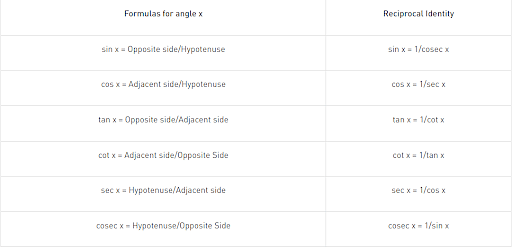Prove that cos2 2x-cos2 6x = sin 4x sin 8x
Solution and Explanation
It is known that
\(2\,cosA+cosB=2cos(\frac{A+B}{2})cos(\frac{A-B}{2}),\,cosA-cosB=2sin(\frac{A+B}{2})sin(\frac{A-B}{2})\)
∴L.H.S. = cos2 2x-cos2 6x
= (cos 2x +cos 6x) (cos 2x-6x)
\(=[2\,cos(\frac{2x+6x}{2})cos(\frac{2x-6x}{2})][2\,cos(\frac{2x+6x}{2})sin(\frac{2x-6x}{2})]\)
= [2 cos 4x cos (-2x)] [-2 sin 4x (-sin 2x)]
= (2 sin 4x cos 4x) (2 sin 2x cos 2x)
= sin 8x sin 4x
= R.H.S
Top Questions on Trigonometric Functions of Sum and Difference of Two Angles
- In the figure, the value of cosec A is

- TS POLYCET - 2021
- Mathematics
- Trigonometric Functions of Sum and Difference of Two Angles
Prove that. \(sin^2 \frac{π}{6}+cos^2 \frac{π}{3}–tan^2 \frac{π}{4}=-\frac{1}{2}\)
- CBSE Class XI
- Mathematics
- Trigonometric Functions of Sum and Difference of Two Angles
- Prove that. \(2sin^2 \frac{π}{6}+cosec^2 \frac{7π}{6}–cos^2 \frac{π}{3}=\frac{3}{2}\)
- CBSE Class XI
- Mathematics
- Trigonometric Functions of Sum and Difference of Two Angles
- Prove that \(cot^2 \frac{π}{6}+cosec \frac{5π}{6}+3\,tan^2 \frac{π}{6}=6\)
- CBSE Class XI
- Mathematics
- Trigonometric Functions of Sum and Difference of Two Angles
- Prove that \(2sin^2 \frac{3π}{4}+2\,cos^2 \frac{π}{4}+2\,sec^2 \frac{π}{3}=10\)
- CBSE Class XI
- Mathematics
- Trigonometric Functions of Sum and Difference of Two Angles
Questions Asked in CBSE Class XI exam
- Balance the following redox reactions by ion-electron method:
(a)MnO4- (aq) + I - (aq) → MnO2(s) + I2(s) (in basic medium)
(b) MnO4- (aq) + SO2(g) → Mn2+(aq) +HSO4- (aq) (in acidic solution)
(c) H2O2(aq)+Fe2+(aq) → Fe3+ (aq) + H2O (l) (in acidic solution)
(d) Cr2O72-+ SO2(g) → Cr3+ (aq) +SO42- (aq) (in acidic solution)- CBSE Class XI
- Oxidation Number
- Write the resonance structures for SO3 , NO2 and NO3-
- CBSE Class XI
- Kossel-Lewis Approach to Chemical Bonding
- At 700 K, equilibrium constant for the reaction:
\(H_2 (g) + I_2 (g) ⇋ 2HI (g)\)
is 54.8. If 0.5 mol L–1 of HI(g) is present at equilibrium at 700 K, what are the concentration of H2(g) and I2(g) assuming that we initially started with HI(g) and allowed it to reach equilibrium at 700 K?- CBSE Class XI
- Law Of Chemical Equilibrium And Equilibrium Constant
- Find the mean deviation about the mean for the data 4, 7, 8, 9, 10, 12, 13, 17.
- CBSE Class XI
- Statistics
Find the mean deviation about the mean for the data 38, 70, 48, 40, 42, 55, 63, 46, 54, 44.
- CBSE Class XI
- Statistics
Concepts Used:
Trigonometric Functions
The relationship between the sides and angles of a right-angle triangle is described by trigonometry functions, sometimes known as circular functions. These trigonometric functions derive the relationship between the angles and sides of a triangle. In trigonometry, there are three primary functions of sine (sin), cosine (cos), tangent (tan). The other three main functions can be derived from the primary functions as cotangent (cot), secant (sec), and cosecant (cosec).
Six Basic Trigonometric Functions:
- Sine Function: The ratio between the length of the opposite side of the triangle to the length of the hypotenuse of the triangle.
sin x = a/h
- Cosine Function: The ratio between the length of the adjacent side of the triangle to the length of the hypotenuse of the triangle.
cos x = b/h
- Tangent Function: The ratio between the length of the opposite side of the triangle to the adjacent side length.
tan x = a/b
Tan x can also be represented as sin x/cos x
- Secant Function: The reciprocal of the cosine function.
sec x = 1/cosx = h/b
- Cosecant Function: The reciprocal of the sine function.
cosec x = 1/sinx = h/a
- Cotangent Function: The reciprocal of the tangent function.
cot x = 1/tan x = b/a
Formulas of Trigonometric Functions:
